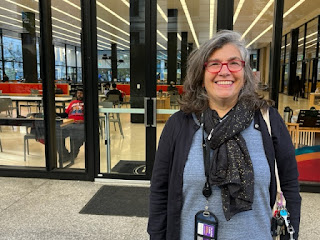Reaching Zero
"Systems are designed to get the results you get and If you don't like the system you need to go back and change it. It is our responsibility as drivers of the system to set up something better". Erin Healy, Community Solutions
So, everything I have heard along the way on this journey points to collaboration as a key to addressing homelessness, but I constantly wonder whether it is easier said than done. The reality being that many organisations (including Councils) have their own drivers, different skill sets and competing funding sources.
The
Community Solutions model for ending homelessness is based on collaboration and
sharing, so it was great to have a chat with
Erin Healy and KO Campbell about just that when I was in New York.
Above (L-R): Thank you to the lovely Erin Healy and KO Campbell for an excellent afternoon and discussion
Built
for Zero rides on a few straight forward principles:
- Create
an accountable team. No single actor is fully accountable for ending
homelessness - all key players work together
- Set a
shared aim. Have a unified aim and make a commitment to a measurable end
state
- Use
real-time, by-name data. Commit to collecting quality, real time,
person-specific data
- Make
targeted investments. Based on data, secure the right housing resources
for your community
Below
are my notes from our conversation and some resources….
What
are some of the barriers?
Housing
- Housing is too often seen as a vehicle for wealth
- and as long as it will be a mechanism for making money we will see increasing
numbers of people experiencing homelessness.
Funding
- Some
cities are doing great work and are very innovative but funding systems don't
help that. The same projects, year after
year. No one innovates. The easiest thing to do is the same thing.
Accountability
- In
the US, homelessness is not thought of as an issue. Government disperses seeds
of funding. No lines of accountability and no central strategy.
Sharing
data - There
may be privacy concerns about data, but would you rather people die? We need to
get around them by considering homelessness what it is - a public health
emergency.
What can we do?
Collaborate
- The
biggest mindset shift in Built for Zero is getting multiple agencies
working as a team. That allows us to track performance at a system level.
They will all have agency level data.
- You
need to share your data to see if everything - that you are all doing- is
reducing homelessness.
- If you
have the data you can align money to those who do things well, instead of
everyone doing the same thing and doubling up.
- You
can show advantages to thinking system-wide rather than thinking
individually.
- We had
organisations who really did not like each other at the start, who would
do sprints together and at the end be best friends. All the disagreement
goes away. They are on the same team
- You
can also create a centre of gravity to get funding. This approach attracts
a different kind of funder
Know
what you are working on (aka - define it)
- Nothing
moves a team along more than committing to a shared measurable time valued
goal.
- The
first thing we try to get teams to do is to commit to our definitions of
homelessness - functional zero.
- Definitions are really important. It’s the
foundation for getting people to be on a team together. Something that
they are all jointly committed to and doing
- Data
becomes important. Have a baseline. Suddenly you have people who say I
know what we are doing. I know who my partner is.
A
few resources
- Community
Solutions website: https://community.solutions/
- Built
for Zero explainer (and other great videos on their YouTube channel). This
is an easy way to understand the concept - https://www.youtube.com/user/CmtySolutions)
- An
EXCELLENT edition of the Revisionist History podcast by Malcom Gladwell -
A memorial for the Living - find it linked off here - https://community.solutions/remembering-the-lives-lost/





Comments
Post a Comment